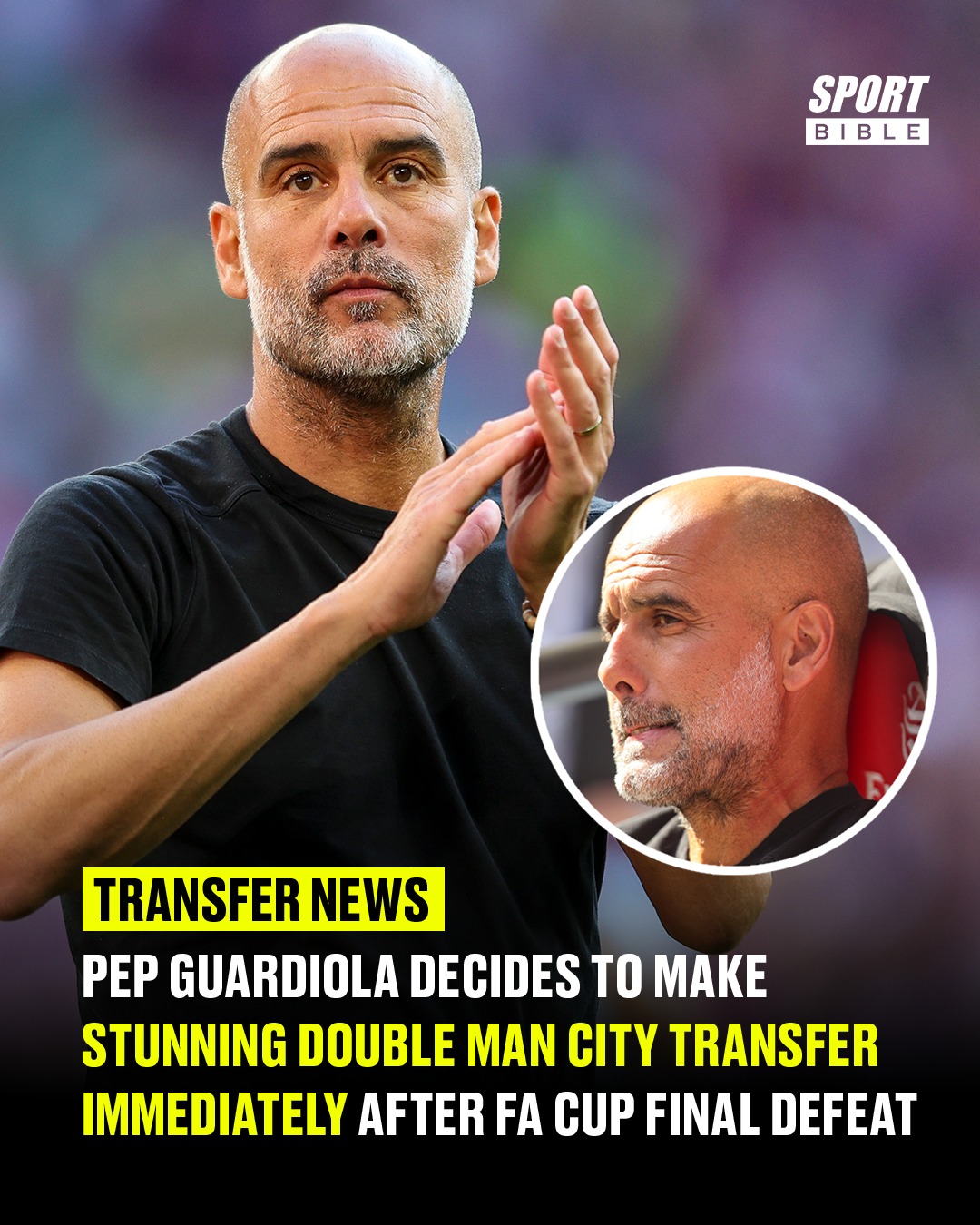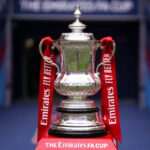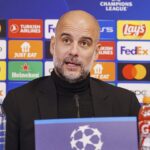He’s seen enough of this squad and City are ready to break the bank! 🤯

In a stunning turn of events that sent shockwaves through English football, Crystal Palace clinched their first major trophy in their 164-year history by defeating Manchester City 1-0 in the FA Cup final at Wembley Stadium. The Eagles’ triumph not only marks a historic moment for the South London club but also signals the end of a disappointing season for Pep Guardiola’s Manchester City, who will finish the campaign without silverware for the first time since the 2016-17 season.
Palace’s Historic Victory
On a sun-drenched Saturday afternoon at Wembley, Crystal Palace produced what many are calling the shock of the season. Under the guidance of manager Oliver Glasner, the Eagles secured their place in football history with a determined performance against the heavily favored Manchester City.
Eberechi Eze emerged as the hero for Palace, scoring the decisive goal in the first half with a clinical finish that ultimately proved to be the difference between the two sides. The moment was particularly poignant for Palace fans, as it sealed their first major trophy and secured European football for the first time since the club’s establishment in 1861.
“It’s an incredible achievement for this group of players and for the club,” Glasner stated in his post-match interview. “To beat a team of Manchester City’s caliber in a final requires perfect execution and absolute belief, and today we showed both those qualities in abundance.”
The victory represents a remarkable turnaround for Crystal Palace, who have often struggled in the shadow of London’s more historically successful clubs. Their journey to FA Cup glory featured several impressive performances, culminating in their tactical masterclass against City at Wembley.
City’s Cup Final Disappointment
For Manchester City, the defeat marks a bitter end to what has been an uncharacteristically difficult season. Having dominated English football for much of Guardiola’s tenure, City’s failure to secure any silverware this season raises questions about whether their era of dominance might be coming to an end.
Despite creating numerous chances throughout the match, City’s normally clinical attack was repeatedly thwarted by Palace goalkeeper Dean Henderson, who produced a series of outstanding saves including a crucial penalty stop from Omar Marmoush shortly before half-time.
The penalty incident proved to be one of the game’s most contentious moments. With City trailing 1-0 and desperately seeking an equalizer before the break, they were awarded a spot-kick after Tyrick Mitchell was adjudged to have fouled Bernardo Silva in the penalty area. Surprisingly, it was Marmoush rather than Erling Haaland who stepped up to take the penalty, a decision that has since sparked significant debate among pundits and fans alike.
Henderson’s heroics continued throughout the second half as City pressed for an equalizer, with Haaland and young talent Nico O’Reilly both squandering golden opportunities to level the scores.
The Penalty Controversy
Perhaps the most discussed aspect of the final has been the decision-making process behind City’s penalty taker. With Haaland, one of the world’s most prolific strikers, on the pitch, many observers were baffled when Marmoush stepped up to take the crucial spot-kick.
In his post-match comments, Guardiola offered a surprising revelation about the incident: “I don’t know. I didn’t speak with them. They take the decision. It’s always [like that] around the penalties. I like the guys who take the initiative. And yeah, they decide.”
When pressed further in his press conference, the City manager elaborated: “We didn’t speak, so they are things in the meetings that are already for them. For that moment, for the free-kicks and penalties, it’s about how you’re feeling, it’s how you feel. They saw that Omar was ready to take it. I think Omar took a lot of time with the ball – stop… take the ball and kick – to then put more pressure on himself. And Henderson made a good save.”
This admission suggests that rather than following a pre-determined strategy, City’s players made an on-the-spot decision that may have cost them dearly. Former Manchester United striker Wayne Rooney, analyzing the game for BBC Sport, had initially speculated that the choice of penalty taker might have been pre-arranged by Guardiola, but the manager’s comments indicate otherwise.
Henderson-Guardiola Confrontation
The tensions between the two sides spilled over after the final whistle, with City manager Guardiola and Palace goalkeeper Henderson engaging in a heated exchange. Television footage captured Guardiola refusing to shake Henderson’s hand, apparently mouthing the words “it’s not fair.”
The source of Guardiola’s frustration appears to be an earlier incident in which Henderson handled the ball outside his penalty area to prevent Haaland from reaching it. Despite City’s protests, VAR determined that the offense did not warrant a red card as Haaland would have taken the ball too far wide of the goal, and there was a Palace defender in line with the Norwegian striker.
Henderson has since confirmed that he said to Guardiola: “You got your 10 minutes. 10 minutes, yeah?” This comment likely refers to the amount of added time at the end of the match, suggesting that Henderson felt City had been given more than enough opportunity to find an equalizer.
The confrontation has added another layer of drama to what was already a memorable FA Cup final, with supporters of both teams taking to social media to debate the merits of each side’s grievances.
Tactical Analysis: Where City Went Wrong
Beyond the penalty miss and the post-match confrontation, tactical decisions by Guardiola have come under scrutiny in the wake of the defeat. Many fans and pundits have pointed to two major errors that they believe cost City the trophy.
Firstly, Guardiola’s reliance on both Savinho and Jeremy Doku in the starting lineup has been questioned. Both players offer similar attributes down the flanks, and according to some observers, their simultaneous inclusion led to a lack of variety in City’s attacking approach. One fan commented on social media: “Pep single handedly losing this game. Wasn’t the right matchup to start both Doku and Savinho.”
Secondly, the timing of Guardiola’s substitutions has faced criticism. Bernardo Silva and Savinho were both withdrawn in the closing stages of the match, but many felt these changes should have been made much earlier. “88th minute is when he’s finally taking off Bernardo honestly you deserve this loss Pep,” wrote one disgruntled City supporter.
Despite these criticisms, Guardiola maintained that his team performed well, claiming they were “much, much better” than in last season’s FA Cup final, where they lost 2-1 to Manchester United. This statement suggests that while the result was disappointing, the City manager saw enough positive signs to believe his team remains on the right track.
City’s Planned Transfer Response
In what appears to be an immediate reaction to their FA Cup disappointment, reports suggest that Manchester City are preparing to make two significant signings ahead of the FIFA Club World Cup next month.
According to The Mirror, City are willing to invest up to £180 million to secure the services of Bayer Leverkusen star Florian Wirtz and AC Milan midfielder Tijjani Reijnders in the coming weeks.
Wirtz, who has been linked with several top European clubs including Liverpool and Bayern Munich, has established himself as one of the most exciting young talents in world football. Leverkusen are reportedly demanding in excess of £100 million for the German international, a figure that could be partially offset by including City midfielder James McAtee in any potential deal. City currently value McAtee, who has made 27 appearances across all competitions this season, at approximately £25 million.
Meanwhile, AC Milan have made it clear that they expect a club-record fee of at least £56.3 million for Reijnders, who signed a new five-year contract with the Italian club in March. The 26-year-old Dutch midfielder has been a standout performer for Milan this season, making 52 appearances across all competitions.
These potential signings would represent a significant statement of intent from City, signaling their determination to bounce back strongly from what has been a disappointing campaign by their lofty standards.
What’s Next for City?
With their FA Cup hopes dashed, Manchester City must now turn their attention to securing Champions League qualification for next season. Currently sitting in sixth place in the Premier League table with a game in hand, City face crucial fixtures against Bournemouth (home) and Fulham (away) to close out their domestic campaign.
Victory in both matches would guarantee City a place in next season’s Champions League, ensuring they maintain their status among Europe’s elite clubs despite their trophy-less season.
Beyond these immediate concerns, the summer transfer window will provide Guardiola with an opportunity to refresh his squad. The potential arrivals of Wirtz and Reijnders would inject new energy and creativity into a midfield that has at times lacked the dynamism of previous seasons, particularly following the departure of İlkay Gündoğan to Barcelona last summer.
The FIFA Club World Cup also looms on the horizon, offering City an early opportunity to compete for silverware in the 2025-26 season. Success in this tournament would go some way toward erasing the disappointment of their FA Cup final defeat and could provide momentum for the challenges that lie ahead.
Legacy of Palace’s Triumph
For Crystal Palace, their FA Cup victory represents not just a singular achievement but potentially the dawn of a new era for the club. European qualification will bring both financial rewards and enhanced prestige, potentially making Palace a more attractive destination for top players.
Manager Oliver Glasner, who took over at Selhurst Park midway through the season, has quickly established himself as a tactically astute leader capable of organizing his team to compete with the very best. The Austrian’s stock has risen considerably following this triumph, and Palace fans will be hoping he can build on this success to establish the club as regular contenders for European places in the Premier League.
Eberechi Eze’s match-winning performance will also have caught the attention of bigger clubs, potentially leading to transfer interest in the summer. However, the glow of FA Cup success and the prospect of European football might be enough to convince Palace’s star players that their immediate futures lie in South London.
Conclusions: A Changing Landscape?
Crystal Palace’s triumph over Manchester City in the FA Cup final could be viewed as simply an upset, a one-off result in a knockout competition. However, when considered alongside City’s broader struggles this season, it raises questions about whether the landscape of English football might be shifting.
After years of dominance under Guardiola, City have appeared more vulnerable this season, dropping points in matches they would previously have won comfortably and now failing to secure any silverware. While their planned transfer activity suggests they are determined to address these issues, the effectiveness of their response remains to be seen.
For clubs like Crystal Palace, City’s relative decline offers hope that with the right management, recruitment, and tactical approach, they too can achieve success at the highest level. The gap between the traditional “Big Six” and the rest of the Premier League appears to be narrowing, potentially heralding a more competitive era in English football.
As Palace celebrate their historic achievement and City plot their response, one thing is certain: the 2025 FA Cup final will be remembered as a pivotal moment in the recent history of both clubs, with the full implications of Palace’s victory and City’s defeat likely to unfold in the months and years ahead.
The final whistle at Wembley didn’t just end a football match; it potentially signaled the beginning of a new chapter in the ever-evolving story of English football. Whether City can recover their dominant position or whether clubs like Palace can build on their breakthrough success will be one of the most fascinating narratives to follow in the coming seasons.
For now, though, the FA Cup belongs to Crystal Palace, and no one can take away the moment when Eberechi Eze’s strike hit the back of the net, sending the red and blue half of Wembley into raptures and writing a new chapter in the club’s long and often challenging history.
Player Performances and Ratings
Crystal Palace
Dean Henderson: 9/10 – Man of the match performance from the Palace goalkeeper. His penalty save from Marmoush was crucial, and he made several other important stops throughout the match. His handling outside the area was controversial but unpunished.
Nathaniel Clyne: 8/10 – The experienced right-back rolled back the years with a disciplined defensive display, keeping City’s wingers at bay for much of the match.
Marc Guéhi: 8.5/10 – Palace’s captain was a rock at the heart of defense, making several crucial interventions and organizing his backline effectively against City’s star-studded attack.
Joachim Andersen: 8/10 – Formed a solid partnership with Guéhi, using his experience and reading of the game to frustrate Haaland throughout.
Tyrick Mitchell: 7.5/10 – Conceded the penalty but otherwise put in a strong shift at left-back, balancing defensive duties with occasional forays forward.
Adam Wharton: 8/10 – The young midfielder showed maturity beyond his years, helping Palace retain possession under pressure and breaking up City attacks.
Will Hughes: 7.5/10 – Energetic and combative in midfield, Hughes’ work rate was crucial in disrupting City’s rhythm.
Michael Olise: 8/10 – Provided the assist for Eze’s goal and was a constant threat with his direct running and creativity.
Eberechi Eze: 9/10 – The match-winner took his goal superbly and was at the heart of Palace’s best attacking moments. A performance that will live long in the memory of Palace fans.
Jean-Philippe Mateta: 7.5/10 – Led the line admirably, holding up play and bringing others into the game despite limited service.
Manchester City
Ederson: 6/10 – Had little chance with Eze’s goal and wasn’t significantly tested otherwise.
Kyle Walker: 6.5/10 – Offered his usual pace and energy down the right but couldn’t make a decisive contribution in the final third.
Ruben Dias: 7/10 – Generally solid but couldn’t organize the defense effectively enough to prevent Palace’s goal.
John Stones: 6.5/10 – Comfortable in possession but occasionally troubled by Palace’s quick transitions.
Josko Gvardiol: 6/10 – Not at his best, with several passes going astray and struggling to contain Olise at times.
Rodri: 7/10 – Typically composed in midfield but unable to dictate the tempo as effectively as usual against Palace’s energetic pressing.
Bernardo Silva: 6/10 – Won the penalty but otherwise had a quiet game by his standards. Perhaps should have been substituted earlier.
Kevin De Bruyne: 7/10 – Created several chances with his trademark passing but couldn’t provide the killer ball City needed.
Savinho: 5.5/10 – Struggled to make an impact and was frequently frustrated by Palace’s disciplined defending.
Erling Haaland: 6/10 – Missed a golden opportunity to equalize and his decision to allow Marmoush to take the penalty will be questioned.
Jeremy Doku: 6/10 – Showed flashes of his dribbling ability but lacked end product when it mattered most.
The contrasting performances of Henderson and Marmoush perhaps best symbolize the day’s events – one rising to the occasion to create history, the other faltering at a crucial moment to extend his team’s disappointment. In cup finals, such fine margins often make all the difference.















